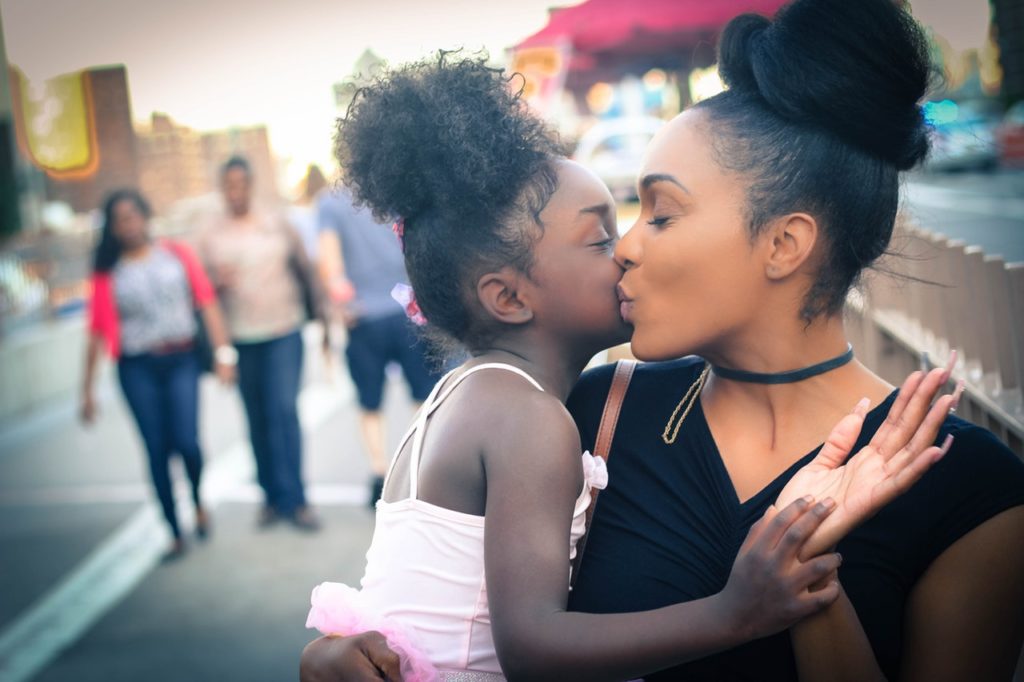
in Choose Hope Today, Living Hope
Mother’s Day has now come and gone — and I still find myself with the same takeaway: Mother’s Day is such a commercialized holiday. It feels impossible to find a card that is a truly authentic representation of the relationships mothers and daughters have with one another. I would venture to say it’s especially hard when you’re an adult daughter (i.e. no one’s picking out the card for you) and find yourself searching the Hallmark aisles for just the right words to share with your mother. The commercialized aspect of the holiday has its megaphone and is doing an all-call for the idyllic versions of mother-daughter relationships – fueling a multitude of unrealistic and unfair expectations on all sides. And, it’s with this in mind, that I can’t help but think about how many of us probably plowed through, got the card that was “close enough” and tried our damndest to avoid sitting with any discomfort. In full transparency, I was just as guilty as the next daughter on this one.
The reality I’m speaking of is that mother-daughter relationships are messy and complex. Mothers are broken human beings just like their daughters.
They come into the role and responsibilities of motherhood with their own pain, heartache, complexity, and messiness from their own relationships with their mothers (or, in many cases, lack thereof). They bring with them a whole host of internal and external expectations to get it right this time, to not do that thing that their mother did or didn’t do, and to keep their daughters from as much pain, heartache, and messiness as possible. Or, conversely, to give them so much more margin to be themselves than their overprotective mother – leaving their daughters yearning for more structure, protection, and boundaries.
There are so many contradicting expectations on women.
Do it all, but make time for yourself. Put yourself first, but make sure your friends, spouse, family members, children, etc. never feel less than top priority. Have rock-solid, clear-cut boundaries but don’t be too harsh because you don’t want to come across as a you-know-what. For mothers, these contradicting expectations seem even more exaggerated. There’s this unspoken rule that how you are as a mother determines how your child will turn out. This becomes even more exaggerated and intensified between mothers and daughters.
For many of us, our mothers were raised in a different time than we were. This fact alone can bring up, at the very least, a disconnect between mothers and their daughters on priorities and life choices. What our mothers chose in their 20s, 30s, and 40s looked a lot different than what we’re choosing today. It can be challenging to navigate this disconnect because the knee jerk response is to categorize one person’s priorities and choices as bad/wrong and the other as right/good.
It’s important to Practice Surrender in these moments and to remember that it’s just different. There doesn’t have to be a value judgment placed on it at all.
For many of us, our mothers have experienced little t and big T traumas (read more about trauma here) that significantly impact the way they parent us. And, unfortunately, this can result in us, the daughters, experiencing some form of little t or even big T trauma from our mother’s way of parenting and connecting. This is hard and some of the messiest work because it requires both mother and daughter to practice Stillness. To really sit with what is instead of what could have been or what could be. Stillness enables us to step back and see things more clearly.
Clarity is a tricky thing though. It’s powerful. It often unveils things to us that we don’t necessarily have to choose to follow but we can no longer ignore.
Clarity also offers us a chance to Practice Grief. It’s not effective to grieve for that which we do not even know or understand.
What’s often misunderstood in our world is that there are different types of grieving. Grief is defined as “Deep sorrow, especially that caused by someone’s death.” That definition always stops me in my tracks. Sometimes we are grieving a physical death of someone and, more or less, that’s a grief that is openly discussed, expected, and accepted.
But there’s grieving to do when our expectations die – when we realize that we either aren’t going to meet them, our mothers aren’t going to meet them, or that they were never healthy or realistic expectations to begin with.
It’s important to remember that grief is a necessary part of diminishing the impact of trauma. But often, trauma has a generational impact. As you are healing as a daughter, it is important to recognize that there is necessary grief on the part of your mother as well. This recognition makes way for the empathy that can work toward repairing aspects of the mother-daughter relationship.
It’s challenging to fully face what’s happening within your own relationship with your mother. It takes time and persistence. And yet, when we can allow ourselves to mourn all that isn’t met, or wasn’t met, or didn’t happen, or happened differently – and face what is – we are able to Practice Honesty. This will look different across all mother-daughter relationships but having some tools is valuable. As you Practice Honesty, it’s helpful to have simple statements on deck, especially during challenging interactions: “I feel bad after you said/did that and I’m not even sure why,” or “It feels like there’s something deeper going on here and I’m not sure what to do.” This kind of open, direct, and truthful engagement is where change can happen.
As a therapist, and a daughter myself, I cringe as I type the word change. Not because I don’t believe in it, but because I know that when anyone discusses change – readers perk up and pay close attention. The change I am speaking of, however, is not necessarily one that’s going to be linear or quick. It also might look nothing like you expected. Within the process of change, the Practice of Curiosity is vital. It’s tough to be curious about ourselves. As a society, but especially as women, Curiosity about ourselves can rapidly turn into a shaming experience where we berate ourselves over where we aren’t enough or are too much. I’m suggesting you use Curiosity to explore where you can change. Where can you do things differently within yourself? What do you bring to the table in your relationship with your mother? How are you interacting with your mother? Why are these interactions leaving you feeling X? Where can you change what you bring to the table?
It can be easy at this point in the Practices to say, “I’ve got all these new awarenesses and feel vulnerable as all get out. Now what?” Forgiveness is the next part of this journey.
Forgiveness of yourself as a daughter for the things you did or didn’t do, the ways you wounded your mother, the times you didn’t listen to your inner voice, and desperately wish you had, because you wanted to please your mother. Forgiveness of your mother for the things she did or didn’t do, the ways she wounded you, the times she put so much pressure or expectation around you that you felt you couldn’t listen to your inner voice.
The Practice of Forgiveness allows us as daughters to truly live in freedom – from resentment, contempt, shame, anger, and unmet expectations.
You have put in the blood, sweat, and tears to get to where you are now. And this place is one in which you get to choose how you want to move forward. This is the Practice of Resilience. This is going to look different for every daughter and their mother. What’s most important here, however, is reminding you that, for some, Resilience in this relationship looks like you and your mother rebuilding things, learning new ways to connect, and having a healthier, richer relationship. For others, it can look like stepping back, creating some margin away from your mother, and reflecting on what you need to put in place to have an active relationship or if it’s even safe and healthy for you to do so. One is not success and the other failure. And, as with most things in life, it’s rarely one or the other.
Resilience in this relationship will likely be a combination of you finding where you can richly and healthily connect with your mother and investing there; as well as identifying, sticking to and steering clear of the areas where you and your mother can’t richly and healthily connect. This Practice requires grace and patience for yourself, your mother, and the process.
There’s a Joy that comes from being true to yourself and this isn’t excluded from your relationship with your mother. Getting to the place of owning who you are, as her daughter, and what your truth is takes hard work. It also yields great reward because when you are able to use these Practices over and over, you will find that it leaves you experiencing a Joy that buoys you as you make the right choice for yourself and for your relationship with your mother. It’s a Joy that is a culmination of Living Hope and, dare I say, it is what living out Hope produces in your entire being. Lastly, it’s a Joy you and I also won’t find represented in a Hallmark aisle or a Mother’s Day gift guide. Thankfully, as cheesy as it sounds, that reality makes it no less real, important, and life-changing.

Anna Carol Thorp is a Licensed Professional Counselor Associate (LPCA) and National Certified Counselor (NCC) in North Carolina. She’s passionate about supporting women and children dealing with life transitions, developmental and relational issues, depression, anxiety, and wellness. She is committed to her own healthy relationships as a daughter, sister, friend, and soon-to-be wife to her fiance, Kyle.
